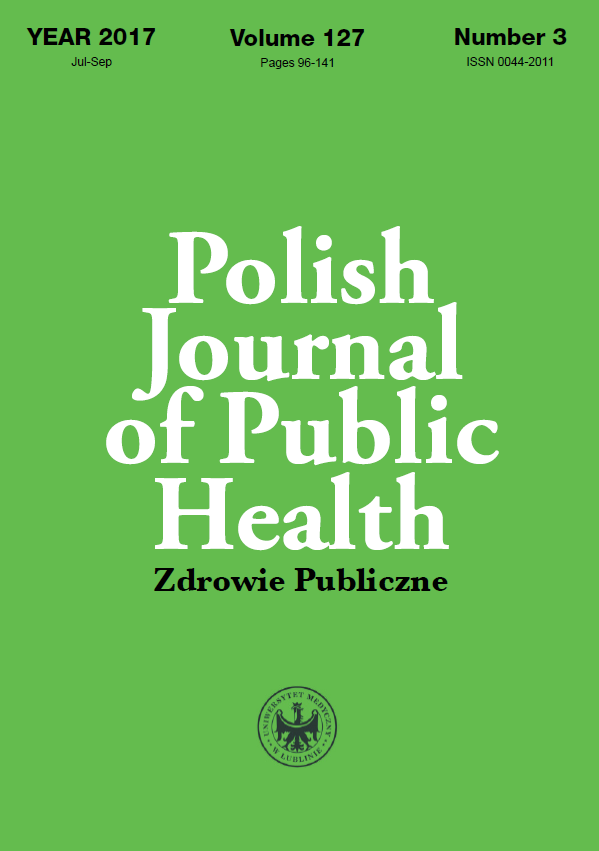Amendments to the treatment regulations at a psychiatric hospital as the element shaping culture in terms of human rights
DOI:
https://doi.org/10.1515/pjph-2017-0030Keywords:
human dignity, human rights, mental illness, direct coercion, patient treatment without consent, social welfare homeAbstract
A psychiatric hospital is a special place. People undergoing treatment are in a unique situation. Mental illness remains a mystery for scientists because we do not know what factors influence its appearance. There were also no drugs that would completely cure the patient, as you never know whether the medicine will affect a particular person. Mental illnesses evoke anxiety and fear of the community. Some patients take disturbing or dangerous actions. Their behaviors are referred to as specific and different ones. A similar situation is caused by the appearance of psychotic symptoms. One should pay attention to delusions and hallucinations here. These symptoms cause the patient’s situation to deteriorate. Ultimately, they can cause dangerous behavior.
It happens that a relative of a patient, who is in such condition, must take action without his/her consent. A similar issue has been analyzed in Poland for almost thirty years. Individual regulations, in exceptional cases, allow for undertaking coercive actions: treating the patient without consent, applying direct coercion. These interventions are controlled. Polish psychiatric legislation is constantly changing (new control institutions are introduced, the role of the family court is increased). This article presents the latest amendments. They are based on the principle of respect for human rights and freedoms.
References
1. Babula M. Placement of a legally incapacitated person in a social care home, in: Selected aspects of human rights and bioethics. In: A. Białek, M. Wróblewski (ed). Warszawa: The Ombudsman Office; 2017. p. 143-51.
2. Bomba J. Humanities and respect for human rights in difficult conditions Psychiatr Pol. 1993:3:225-39.
3. Balicki M. Coercion in psychiatry, regulation and practice. Law Med. 1999:1:40-61.
4. Babiuch H. The scope of parents’ rights to raise a child according to their beliefs. Scientific Papers of the State Higher Vocational School in Legnica. 2014:13:7-17.
5. Constitution of the Republic of Poland of April 2, 1997, adopted by the National Assembly on April 2, 1997, accepted by the Nation in a constitutional referendum on May 25, 1997, undersigned by the President of the Republic of Poland on July 16, 1997. J Laws. 1997;78:483.
6. Dąbrowski S. The rights of the mentally ill and the premises of forced hospitalization. In: M. Siwiak-Kobayashi, S. Leder (ed). Psychiatria i etyka. Kraków: Library of Polish Psychiatry; 1995. p. 53-60.
7. Judgment of the Constitutional Tribunal of March 7, 2007 Ref. act K 28/05.
8. Ignatowicz J, Nazar M. Family law. Warszawa: LexisNexis; 2006.
9. Kubanek A. Direct coercion used for therapeutic purposes. TBSP Internet Legal Rev. 2015:4:159-88.
10. Karkowska D. Patients’ rights. Warszawa: ABC Publishing House; 2004.
11. Kmieciak B. Direct coercion from the perspective of proposed amendments to the Act on Mental Health Protection. Pract Med – Psychiatry. 2017:6:69-72
12. Karkowska D. The rights of a psychiatric patient. In: M. Wojciechowska (ed). Mental health problems. Łódź: AHE Publishing House; 2010. p. 143-57.
13. Code of Medical Ethics of January 2, 2004, consolidated text, including the amendments adopted on September 20, 2003 by the Extraordinary VII National Congress of Physicians. Warsaw; 2004.
14. Message: The President has undersigned the amendment to the Mental Health Protection Act. Rynek Zdr. [http://www.rynekzdrowia.pl/Politykazdrowotna/Prezydent-podpisal-ustawe-o-zmianach-w-ochronie-zdrowiapsychicznego,179570,14.html ]
15. The Act of November 24, 2017. amending the Mental Health Protection Act and several other acts. J Laws. 2017, item 2439.
16. The Act of February 25, 1964 – the Family and Guardianship Code. J Laws. 1964, no. 9, item 59 .
17. The Act of August 19, 1994, on the Mental Health Protectio. J Laws. 1994, no. 111, item 535
18. The Minister of Health Regulation, on November 9, 2015, on the matter of types and extent of medical documentation and the respective processing methods. J Laws. 2015, item 2069.
19. Oleksiewicz I. The evolution of the human rights system in the European Union. Scientific Papers Department of Europe. 2009:3:41-66.
20. Piechowiak M. Human rights encyclopaedic entry. In: Universal encyclopedia of philosophy, Polish Society of Thomas Aquinas, p. 1, online
21. Pużyński S. Dilemmas of contemporary psychiatry. Warszawa: Clinical, ethical and legal problems: Eneteia Publisher; 2015.
22. Schma GW. Therapeutic Jurisprudence. Michigan Bar J. 2003:1:23-6.
23. Winczorek P. Commentary to the Constitution of the Republic of Poland. Warszawa: PWN; 2000.
24. Wroński K, Frąckowiak K, Frąckowiak L. Use of direct coercion measures in relation to the patient. Fam Med. 2014:4:198-201.
25. Zielińska E. Act on the professions of a doctor and dentist. Warszawa: ABC Publishing House; 2008.
Downloads
Published
Issue
Section
License
Copyright (c) 2018 Polish Journal of Public Health

This work is licensed under a Creative Commons Attribution-NonCommercial-NoDerivatives 3.0 Unported License.


